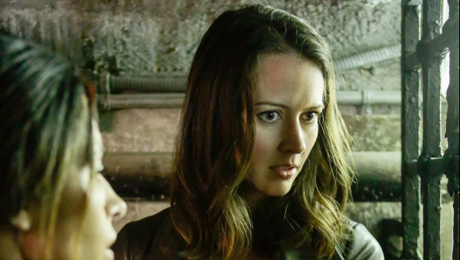Deus ex machina.
God from the machine.
I avoid predicting television shows because viewers rarely have enough information to make good ones. I tried earlier this season with Person of Interest and it blew up in my face, so I’m loathe to do it again. But I will.
My prediction for the Person of Interest season finale is that Harold has to choose between The Machine and Samaritan.
I am pushed to the point of prediction by the dialogue surrounding Harold in the past two episodes. Look at some of these lines:
“I can’t help you make a picture of God.” – Grace said to Greer as he seeks information about Harold.
“Perhaps you can.”
This conversation between Greer and Finch was amazing.
“I want to talk about the future. And who more qualified for that conversation than the father of artificial intelligence?” – Greer to Finch while Greer has him captive.
“I’d always imagined it was about the power of creation.” – Greer
“Now your God has disappeared, operating on its own accord. Children can be so disappointing.” – Greer
“I’d be aware of false idols, Mr. Greer.”
“As the father of AI you’re the only one in the world that can destroy it.” – Greer. Noah? The flood? Anyone?
“Having built something significantly smarter than myself how could I possibly anticipate its evolution?” – Finch
“You’re a destroyer, not a creator,” – Harold. OH MY GOD.
“The father became fearful of his son.” – Greer
“I built the machine to save lives. But how could I be certain that it wouldn’t one day determine that all of humanity was irrelevant?” Finch, to Greer.
“It’s pure hubris to think that you could control something so powerful.” Finch, to Greer.
“That is the most important man in the world. The father of a new age.” – Greer about Finch.
Father, creator, evolution. Shows don’t run up to their season finale with dialogue like that by accident. Greer’s search for Harold has now spanned two seasons and it will come to a head in a season finale entitled Deus ex Machina. Making Harold the subject of all this talk – the one who created this intelligence and imparted into it his humanity – leads me to believe he is approaching his moment of truth.
Covering my bases:
In the midst of a double-bogey this morning I was thinking back to the end of last season. The Machine went into “God Mode” and spoke directly to Root and Reese after shutting itself down due to a virus unleashed by Decima. Everyone converged on what they thought was The Machine, only to find out it had dissembled itself and shipped its components off to parts unknown. We still don’t know where it went, and it hasn’t been very much of a subject this season. I doubt that facet of the story will be brought up in this season’s finale, too.
But it got me thinking. God from the machine. The Machine evolved from what Harold first created. It knew enough to hide from Root, then it initiated an “analog interface” to use Root to prepare for what she (The Machine she, not Root she) saw coming, which we now have to believe is Samaritan.
There’s a literary meaning to deus ex machina that symbolizes when a story suddenly comes together in such a preposterous way that it is almost comedic. Writers try to avoid it for that reason, but it doesn’t have to be that literal for the season finale. It can mean The Machine does something no one – Harold, Greer, Collier – expects. Something like take herself apart and ship herself somewhere else.
One last thing bugs me from the most recent episode: Who sent Collier that text? He just found out his brother committed suicide for wrongly being accused of a crime by The Machine and – bam – he gets this text from someone who claims to be able to tell him what happened. My crackpot theory: The Machine sent it to start the process that will end in the season finale. My even more crackpot theory: Samaritan did it.
We’ll find out Tuesday.




